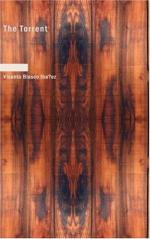The venerable orator folded his arms and waited for the noise in the Chamber to cease. When the last determined fugitives had disappeared through the exit doors, he began to speak. The journalists in the press-gallery craned their necks toward “the tribune,” hushing for silence in order not to lose a word.
This man was the patriarch of the Chamber. He represented “the Revolution”—not only the old-fashioned, the political, revolution, but the modern, the social and economic revolution. He was the enemy of all present systems of government and society. His theories irritated everybody, like a new and incomprehensible music falling on slumbering ears. But he was listened to with respect, with the veneration inspired by his years and his unsullied career. His voice had the melodious feebleness of a muffled, silver bell; and his words rolled through the silence of the hall with a certain prophetic stateliness, as if the vision of a better world were passing before his eyes as he spoke, the revelation of a perfect society of the future, where there would be no oppression and no misery, the dream he had so often dreamed in the solitude of his study.
Rafael was sitting at the head of the committee bench, somewhat apart from his companions. They were giving him ample room, as bull-fighters do their matador. He had bundles of documents and volumes piled up at his seat, in case he should need to quote authorities in his reply to the venerable orator.
He was studying the old man admiringly and in silence. What a strong, sturdy spirit, as hard and cold and clear as ice! That veteran had doubtless had his passions like other men. At moments, through his calm impassive exterior, a romantic vehemence would seem to burn, a poetic ardor, that politics had smothered, but which smouldered on as volcanic fires lie dormant rumbling from time to time under the mantle of snow on a mountain peak. But he had known how to adjust his life to duty; and without belief in God, with the support of philosophy only, his virtue had been strong enough to disarm his most violent enemies.
And a weakling, a dawdler like himself, must reply to a hero like that!... Rafael began to be afraid; and to recover his spirits he swept the hall with his eyes. What the regular hangers-on of the sessions would have called a medium-sized house! A few deputies scattered about the benches! But the public galleries were filled with spectators, workingmen mostly, absolutely quiet, and all ears, as if they were drinking in every word of the old republican! In the reserved seats, just previously packed with curiosity-seekers interested in the set-to scheduled for the opening of the session, only a few foreign tourists were left. They were taking in everything—even the fantastic uniforms of the mace-bearers; and they were determined not to leave until they were put out. A few women of the so-called “parliament set,” who came every afternoon when there was a squabble




